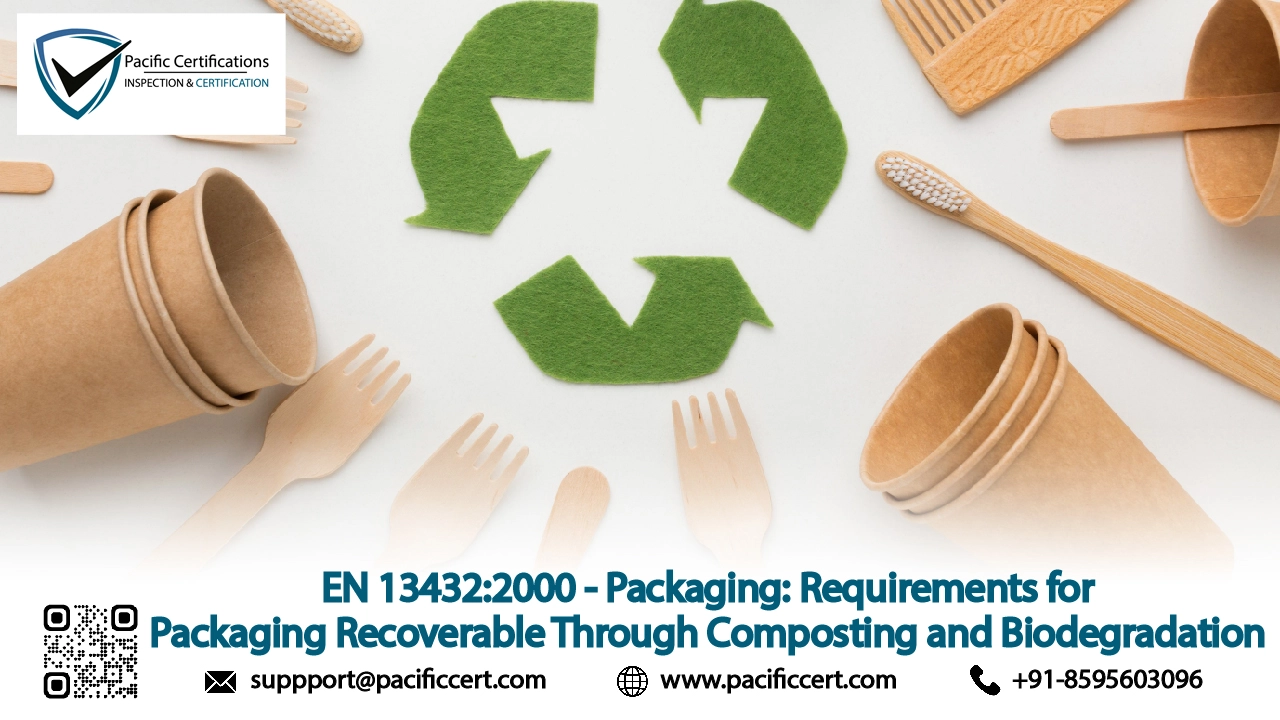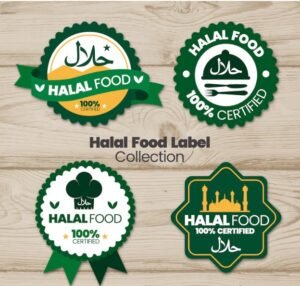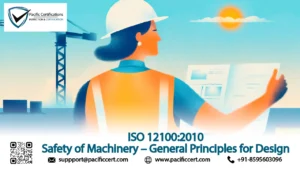What is EN 13432:2000?

EN 13432:2000 is a European standard that sets the criteria for packaging recoverable through composting and biodegradation. It defines the conditions under which packaging materials can be treated as biodegradable in industrial composting facilities. The standard applies to all packaging and packaging components made from biodegradable materials including plastics to fillers.
This standard ensures that packaging breaks down during composting without causing harm to the compost or environment. It evaluates biodegradability and the presence of heavy metals or hazardous substances. EN 13432 is widely referenced by manufacturers and certifying bodies when verifying compostable packaging.

For audit and certification assistance, contact us at support@pacificcert.com
Purpose
The purpose of EN 13432 is to establish clear criteria to identify packaging that can safely biodegrade in industrial composting environments. The standard addresses the growing need to reduce plastic waste and supports environmentally sound alternatives. It serves as a guide for producers and suppliers of packaging to verify that their products decompose within a specific time under controlled composting conditions.
Scope and Applicability
EN 13432:2000 applies to all packaging materials and components that claim to be compostable or biodegradable. This includes bags, wrappers, films, containers, trays, and labels. The standard is applicable regardless of material origin—natural, synthetic, or composite.
It is relevant for industries involved in food packaging, consumer goods, and agricultural applications. The standard also supports waste processors, municipalities, and certification bodies responsible for assessing compost quality and waste management outcomes.
Key Definitions
Biodegradation: Breakdown of materials by microorganisms into carbon dioxide, water, and biomass.
Disintegration: Physical fragmentation of packaging during composting, leaving no visible residue.
Composting: A managed process that converts organic waste into stable compost under aerobic conditions.
Compost Quality: Characteristics of the final compost product including absence of toxic elements and suitability for land application.
Heavy Metals: Elements like lead, cadmium, and mercury that must remain within set limits to avoid soil contamination.
What are the requirements of EN 13432:2000?
To meet EN 13432 requirements, packaging materials must satisfy several criteria related to decomposition and environmental safety. The standard mandates controlled testing under specific composting conditions. Below are the key points to know:

- Material must biodegrade by at least 90% within six months under industrial composting conditions
- Disintegration must result in fragments smaller than 2 mm with no more than 10% visible residue after 12 weeks
- Heavy metal content must stay below defined threshold levels (e.g., cadmium, lead, copper)
- The compost resulting from decomposition must not negatively affect plant growth (ecotoxicity test)
- Packaging must be clearly marked or labelled as compostable to avoid confusion during waste sorting
- Entire packaging item including inks, glues, and additives must comply—not just the base material
- Testing must follow protocols such as ISO 14855, ISO 16929, or equivalent European methods
- Documentation must be available to demonstrate conformity during third-party verification
What are the benefits of EN 13432:2000?
Adopting EN 13432:2000 can support environmentally conscious packaging development and improve post-consumer waste treatment processes.

- Encourages use of compostable materials across consumer and food packaging applications
- Reduces landfill waste by supporting organic recycling through industrial composting
- Increases consumer confidence through verifiable compostability claims
- Supports municipal composting programs with packaging that breaks down reliably
- Limits environmental pollution by setting thresholds for toxic elements in packaging
- Helps packaging producers meet EU environmental packaging directives
- Provides clear guidelines for product labeling and claims
- Assists in circular economy goals by turning packaging waste into soil-enriching compost
Organizations working on sustainable packaging are increasingly adopting EN 13432 due to growing consumer demand and waste infrastructure updates. Composting infrastructure across Europe and parts of Asia has seen rapid expansion and governments are phasing out single-use plastics in favor of certified compostable alternatives. Major retailers now require compostable packaging for fresh produce and ready-to-eat meals while public institutions are prioritizing such materials through procurement policies. Innovation in bio-based polymers made from starch and cellulose is growing with many designed to meet EN 13432 standards. Certification is also gaining traction in global trade where import conditions increasingly link to plastic reduction laws and eco-labelling criteria.
Eligibility Criteria
Any organization producing or using biodegradable packaging can apply EN 13432. This includes manufacturers of bioplastic film, molded containers, and packaging converters. It also applies to food producers using compostable trays, bags, or wrappers.
There is no restriction on company size. However, the packaging must be subject to third-party testing and verification for conformity. Businesses must ensure the full packaging product—not just the base material—meets the criteria.
Certification Process: EN 13432:2000
- Identify the packaging item(s) intended for composting
- Review components including inks, coatings, and adhesives
- Conduct laboratory tests for biodegradability and disintegration
- Analyze heavy metal content and perform ecotoxicity assessment
- Submit documentation and test reports to the certifying body
- Stage 1 audit – review test results and supporting data
- Stage 2 audit – assess manufacturing practices and labeling claims
- Certification issued with mark of compostability
Timeline for EN 13432:2000 Certification
The EN 13432:2000 certification timeline typically spans two to three months. This depends on the complexity of the packaging item and the number of tests required. Materials with existing biodegradability test results may proceed faster. If new testing is needed for multiple components or inks, the process may extend to four months.
What is the cost of EN 13432:2000?
Costs vary depending on how many packaging items are submitted and whether new testing is required. Products already certified under equivalent compostability schemes may incur lower costs. Certification is more cost-effective when conducted alongside other packaging assessments such as EN 13428 or ISO 14021.
How can Pacific Certifications help?
Pacific Certifications provides third-party audit and verification services for EN 13432 certification. We assess biodegradability and compostability documentation for packaging items such as trays, films, wraps, and containers, ensuring they meet industrial composting standards from material level to labeling accuracy.
- We review material composition to check if all components are biodegradable
- We verify biodegradation and disintegration test reports for conformity
- We check heavy metal content against the limits specified in the standard
- We assess ecotoxicity test outcomes to ensure compost safety
- We examine packaging labels and claims to confirm clarity and traceability
- We evaluate supporting documents such as safety data sheets or declarations
- We offer bundled audits for EN 13428, ISO 14021, or other related packaging norms
Our goal is to confirm your packaging meets EN 13432 requirements with clear documentation and credible certification.
Training and Courses
Lead Auditor Training: Teaches how to evaluate packaging materials for compostability under EN 13432.
Lead Implementer Training: Provides knowledge for integrating EN 13432 requirements into design and manufacturing.
Internal Auditor Training: Designed for quality teams to maintain conformity across packaging components.
Pacific Certifications provides accredited training programs. If your organization is looking for EN 13432 training our team is equipped to help you. Contact us at support@pacificcert.com
FAQs
Is EN 13432 recognized globally?
It is primarily a European standard but widely accepted in international compostability certification schemes.
Does it cover home composting?
No, it applies to industrial composting. Home composting has different conditions.
Can I certify only the plastic film without the ink?
No, the entire packaging including additives and printing must meet EN 13432.
Is EN 13432 mandatory?
It is required for packaging labeled as compostable in the EU.
What testing standards are used?
Test methods include ISO 14855 and ISO 16929 which simulate industrial composting.
Ready to get EN 13432 certified?
Contact Pacific Certifications to begin your certification journey today!
Suggested Certifications –
Read more: Pacific Blogs






